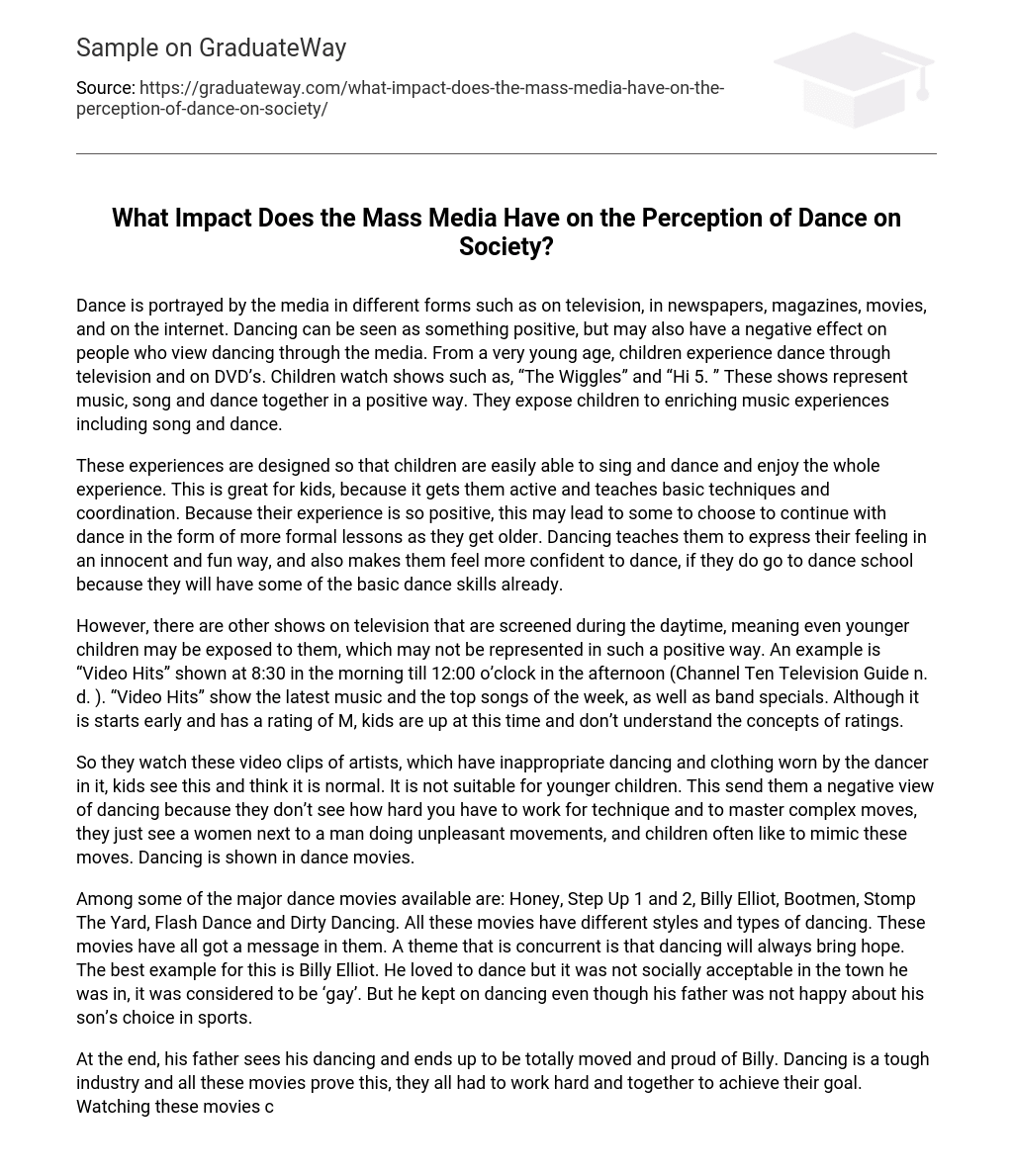Dance is portrayed by the media in different forms such as on television, in newspapers, magazines, movies, and on the internet. Dancing can be seen as something positive, but may also have a negative effect on people who view dancing through the media. From a very young age, children experience dance through television and on DVD’s. Children watch shows such as, “The Wiggles” and “Hi 5. ” These shows represent music, song and dance together in a positive way. They expose children to enriching music experiences including song and dance.
These experiences are designed so that children are easily able to sing and dance and enjoy the whole experience. This is great for kids, because it gets them active and teaches basic techniques and coordination. Because their experience is so positive, this may lead to some to choose to continue with dance in the form of more formal lessons as they get older. Dancing teaches them to express their feeling in an innocent and fun way, and also makes them feel more confident to dance, if they do go to dance school because they will have some of the basic dance skills already.
However, there are other shows on television that are screened during the daytime, meaning even younger children may be exposed to them, which may not be represented in such a positive way. An example is “Video Hits” shown at 8:30 in the morning till 12:00 o’clock in the afternoon (Channel Ten Television Guide n. d. ). “Video Hits” show the latest music and the top songs of the week, as well as band specials. Although it is starts early and has a rating of M, kids are up at this time and don’t understand the concepts of ratings.
So they watch these video clips of artists, which have inappropriate dancing and clothing worn by the dancer in it, kids see this and think it is normal. It is not suitable for younger children. This send them a negative view of dancing because they don’t see how hard you have to work for technique and to master complex moves, they just see a women next to a man doing unpleasant movements, and children often like to mimic these moves. Dancing is shown in dance movies.
Among some of the major dance movies available are: Honey, Step Up 1 and 2, Billy Elliot, Bootmen, Stomp The Yard, Flash Dance and Dirty Dancing. All these movies have different styles and types of dancing. These movies have all got a message in them. A theme that is concurrent is that dancing will always bring hope. The best example for this is Billy Elliot. He loved to dance but it was not socially acceptable in the town he was in, it was considered to be ‘gay’. But he kept on dancing even though his father was not happy about his son’s choice in sports.
At the end, his father sees his dancing and ends up to be totally moved and proud of Billy. Dancing is a tough industry and all these movies prove this, they all had to work hard and together to achieve their goal. Watching these movies can help show how hard you have to work and how you have to train, but the end result of the hard training can truly pay off. These moves promote positive aspects of dance. Other programs shown on television involving dancing are shows like: “So You Think You Can Dance,” and “Dancing With The Stars. So You Think You Can Dance is a competition to find the best dancer in the country. America has had five seasons and Australia has had two. On the 3 February 2008, the premiere of So You Think You Can Dance Australia attracted audience of 2. 15 million viewers. The show was the night’s top-rating program, averaging 1. 83 million viewers on its timeslot. (So You Think You can Dance Statistics n. d. ). By the rating on the first night, So You Think You Can Dance became an instant hit.
These shows were are so popular and promote dancing in such a way that people seem to dance classes as a result. An estimated 1,625,000 people attended dance schools around the country in 2008. Another popular show that is on is “Dancing With The Stars. ” This show started in Australia in 2004 this show is about famous Australian, and Australia’s professional dancers, being paired up and competing against each other to be come the best dancer. After the show aired, an estimated number of male and females, aged 18-60+ taking up a ballroom class is, 2,807200 (2004 Dance Statistics n. . ). By these statistics, this shows a positive outlook on dancing. These shoes show hoe enjoyable dancing is, how hard the training is, and what can come out of all the hard work and persistence can make something extraordinary. Throughout the media, dancing has mostly a positive impact on society. It promotes a healthy and active lifestyle. As well as teaching physical and technical dance skills, it is also teaches about emotion s and how to express emotions through dance. To add, the qualities of persistence and endurance can be learnt.
The media is responsible for bring dance to people who may not otherwise have an opportunity to experience the benefits of dance. Bibliography 2004 Dance Statistics n. d. (Online) Avaliable: http://www. abs. gov. au/AUSSTATS/abs@. nsf/Previousproducts/C45687A471BC2969CA2571E000056696? opendocument (Accessed 12 February 2009) Chanel Ten Television Guide n. d. (Online) Available: http://ten. com. au/tvguide_search. html (Accessed 12 February 2009) So You Think You can Dance Statistics n. d. (Online) Available: http://en. wikipedia. org/wiki/So_You_Think_You_Can_Dance_Australia (Accessed 12 February 2009)





